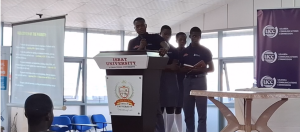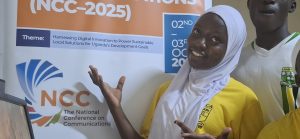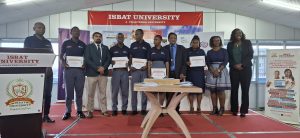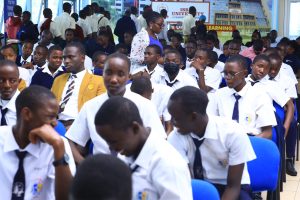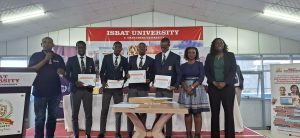Bishop Kivengere Girls School Shines in ICT Club Innovation Challenge with Powerful Albino Awareness App

Bishop Kivengere Girls School made a remarkable appearance in the District School ICT Club Website and App Innovation Challenge held at St. Mary’s College Rushoroza. The school was among several that responded to an official invitation sent out on 3rd July 2022. This competition was aimed at providing a platform for secondary school ICT clubs to showcase their creativity, problem-solving skills, and commitment to using technology to address real-world challenges in their communities.
Representing Bishop Kivengere Girls School was a vibrant team of students under the banner of the Bishop Kivengere Girls School ICT Club. Their submission stood out—a well-designed mobile application dedicated to raising awareness and promoting positive social inclusion for people with albinism. The app was not just a technical prototype; it was a thoughtful solution built to challenge societal stigma, discrimination, and misconceptions surrounding people with albinism.
In their presentation, the students explained that the app was inspired by the observable marginalization of people with albinism within their communities. They noted that many individuals with albinism are often excluded from educational opportunities, face stereotypes, and suffer silently due to a lack of public awareness and empathy. Their app sought to counter these issues through education, storytelling, and interactive features that foster acceptance and understanding.
The application includes features such as:
- Stories and testimonies from people with albinism.
- Educational content to debunk myths and explain the genetic basis of albinism.
- Community engagement tips encouraging users to become advocates for inclusion.
- Inspirational profiles of successful individuals with albinism.
This bold and empathetic innovation demonstrated the power of student-led digital activism. The Bishop Kivengere team showed that technology in the hands of young people is not just for entertainment or routine learning—it can become a powerful voice for those who are unheard and unseen.
Judges, fellow participants, and facilitators were impressed not only by the technical execution of the app but also by the depth of research, emotional intelligence, and leadership displayed by the girls. Their project echoed the broader mission of ICT clubs across Uganda: to encourage digital creativity, promote innovation, and support learners to develop 21st-century skills that are relevant to both local and global challenges.

Special recognition goes to the school administration and the ICT Club patrons for creating an enabling environment where students are encouraged to tackle social issues through technology. Their guidance played a vital role in shaping the project and preparing the team for this district-level competition.
As the Bishop Kivengere Girls School ICT Club continues to grow, it is evident that such platforms not only build technical skills but also empower students to become champions of change within their communities. The club’s success story serves as a shining example to other schools on how ICT can be meaningfully integrated with civic education and social responsibility.
We call upon other schools, stakeholders, NGOs, and well-wishers to support such student-driven innovations, help equip ICT clubs with more resources, and mentor these young changemakers as they build the future of digital Uganda—one idea at a time.

